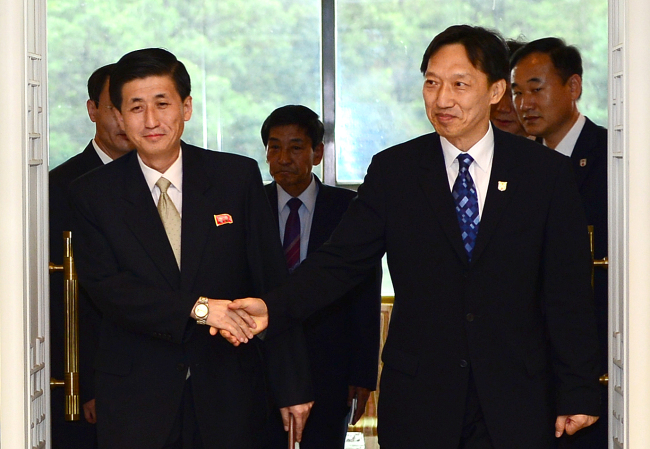Two Koreas to hold family reunions at Geumgang September 25-30
By (공용)코리아헤럴드Published : Aug. 23, 2013 - 20:34

The two Koreas agreed Friday to hold reunions of separated families at the North’s Mount Geumgangsan resort in late September in the latest sign of easing tensions on the peninsula.
During a meeting at the border village of Panmunjeom, Red Cross officials agreed that 100 people from each side would meet their loved ones from Sept. 25-30 in the program that had been suspended for nearly three years.
The two sides will also arrange a video meeting among 40 families from each side from Oct. 22-23 and tentatively agreed to push for an additional reunion event in November, Unification Ministry spokesman Kim Hyung-suk told reporters.
Previous gatherings were held at Mount Geumgangsan with about 100 participants from each side around national holidays including Chuseok, the Korean thanksgiving, which falls on Sept. 19 this year.
Seoul had demanded a sharp increase in the number and to hold the events alternatively in Seoul and Pyongyang. But it decided to accept the proposal by the North, which stuck to the previous format.
In a four-point joint statement they also agreed “to continue efforts to resolve the issue of separated families fundamentally by putting the program on a regular basis, verifying whether family members are alive or not, and arranging exchanges of letters between them.”
“The government sees this agreement as the beginning of the Park Geun-hye administration’s process to resolve the separated families issue,” a ministry official told reporters.
Seoul sought to raise the number of participants from each side to 200, or “as many as possible.” But it could not be carried through due to “capacity constraints,” the official said on condition of anonymity.
Seoul also failed in its attempt to reach an agreement to settle the issue of South Korean prisoners of war and abductees believed to remain in the North.
Spokesman Kim said South Korean delegates during the talks urged the North’s “forward-looking attitude” toward confirming their whereabouts and addresses.
The negotiation followed a last-minute agreement made one day earlier through the Panmunjeom communication channel. Pyongyang conceded to Seoul’s suggestion to meet at the Peace House on the South side of the border village, dropping its preference of Mount Geumgangsan.
Since 2000, the two countries have organized 18 face-to-face and seven video-link meetings for the families displaced by the 1950-53 Korean War. More than 4,320 families have been reunited so far.
The reunions were last held in October 2010 and halted in the wake of the communist country’s attacks on a South Korean corvette and border island in the West Sea earlier that year.
In the Aug. 15 Liberation Day address, President Park Geun-hye suggested resuming family gatherings and establishing a peace park inside the Demilitarized Zone.
The latest negotiations appeared to have kicked off in a congenial atmosphere, led by Lee Duck-hang, a senior official at the South Korean Red Cross, and Park Yong-il, a central committee member of the North Korean Red Cross.
Citing a relatively cool weather as a good signal, Lee said he hoped that the talks would yield “satisfying results for both sides.”
“Since inter-Korean dialogue began in the 1970s, Red Cross talks have always been at the forefront and produced the most achievements. In the current inter-Korean relations, Red Cross groups have lots of work to do,” he said upon the launch of the meeting.
Park, for his part, offered a positive outlook for the talks, referring to the two Koreas’ recent agreement on reopening the Gaeseong industrial park.
“I hope that our Red Cross working-level talks will be a crucial chance, as the North and South sat face to face in a long time and successfully hammered out an agreement for the normalization of the district and now concrete projects are in progress,” Park said.
According to the Unification Ministry, only 72,882 of the 128,842 South Koreans registered since 1988 remain alive as of July 31, meaning that some 2,000 have died each year.
Of the survivors, 9.3 percent were aged over 90, 40.5 percent were in their 80s, 30.6 percent in their 70s and 11.4 percent in their 60s.
By Shin Hyon-hee
(heeshin@heraldcorp.com)





![[K-pop’s dilemma] Can K-pop break free from ‘fandom’ model?](http://res.heraldm.com/phpwas/restmb_idxmake.php?idx=644&simg=/content/image/2024/05/09/20240509050541_0.jpg&u=20240509173751)




![[News Analysis] Yoon's first 2 years marked by intense confrontations, lack of leadership](http://res.heraldm.com/phpwas/restmb_idxmake.php?idx=644&simg=/content/image/2024/05/09/20240509050612_0.jpg&u=20240509233252)







![[Today’s K-pop] NCT’s Mark to drop 1st solo album in February 2025](http://res.heraldm.com/phpwas/restmb_idxmake.php?idx=642&simg=/content/image/2024/05/10/20240510050597_0.jpg&u=)